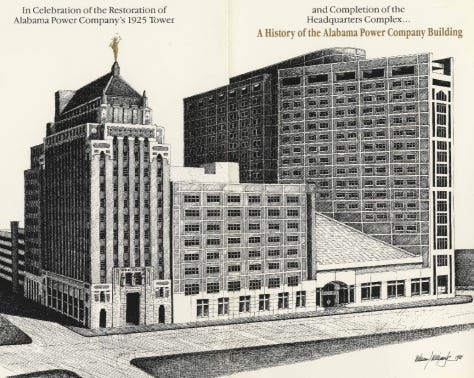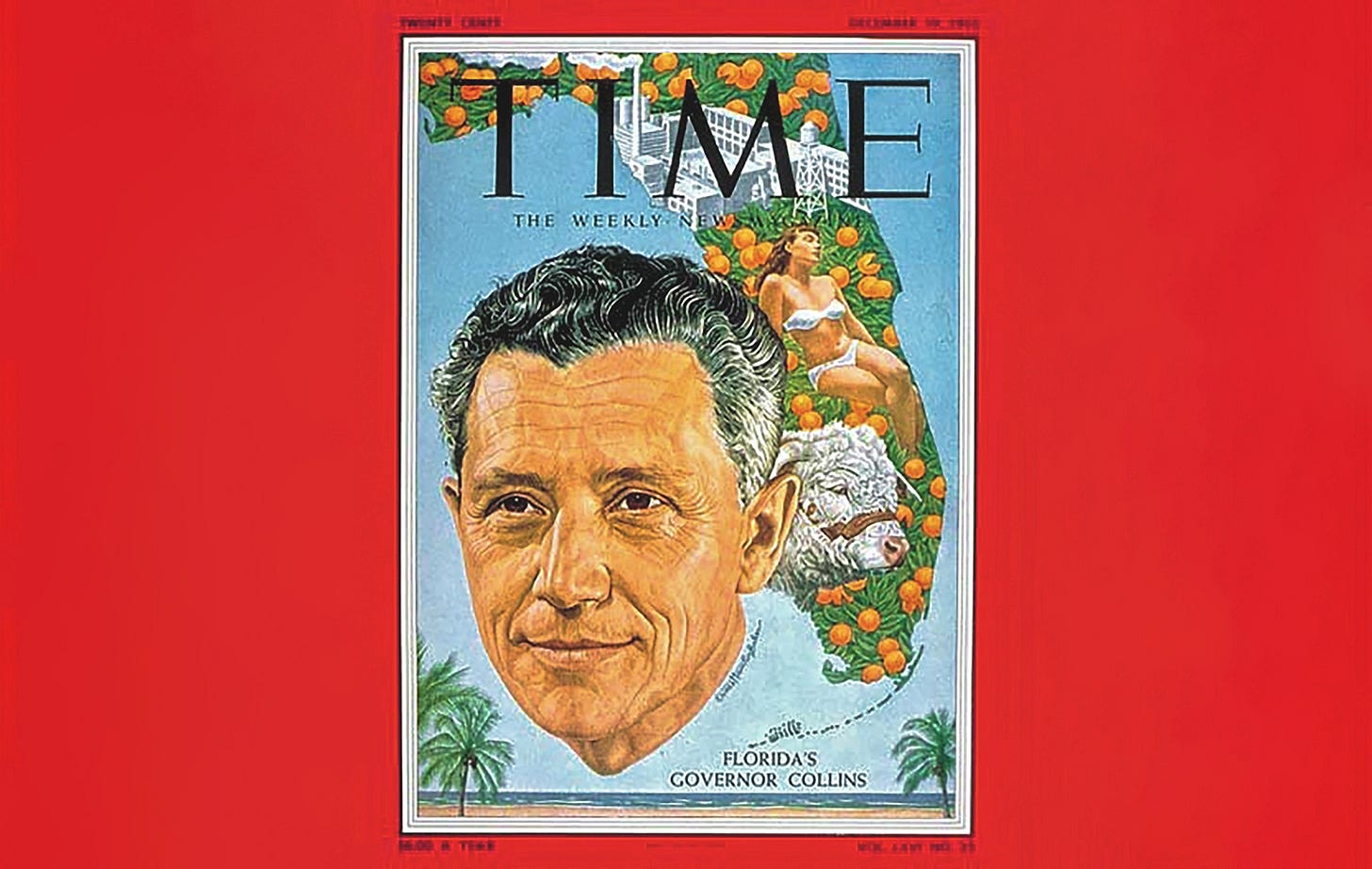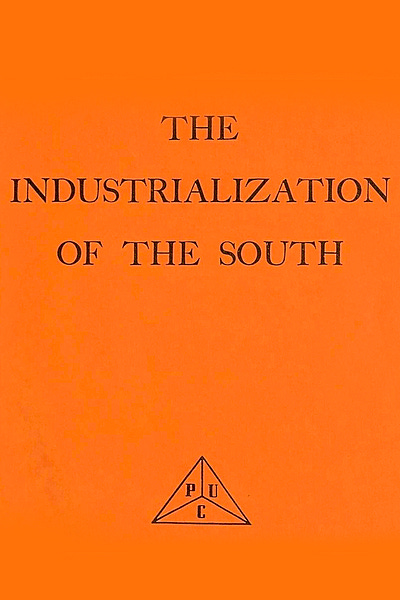The Industrialization of the South
From the Archives
I do not remember where I found this work. A footnote maybe or scrolling the LOC. So, I put out a call to my secret scanner cell of professors and here we are. Below, you’ll find the Table of Contents, some quotes, and a PDF to take with you. In a day or two week or so, I’ll follow up with an addendum, related reading suggestions, and a handful of deep cuts worth your time.
Participants in a conference on the Industrialization of the South should recognize from the start that they are celebrating a ritual that is peculiarly characteristic of the Southern part of the United States. - Robert A. Lively
The Industrialization of the South, Papers Delivered at a Meeting of the Princeton University Conference, April 13 and 14, 1960.
Introduction - Robert A. Lively: Associate Professor of History, Princeton University & Willard Thorp, Holmes Professor of Belles-lettres, Princeton University
A Note On The History Of The Conference Topic - Robert A. Lively
The South, for all its addiction to memory, tradition, to a relatively settled way of life, has for a hundred and fifty years been a land perennially self-conscious about the fact that tomorrow will be different.”
Talk, of course, is a Southern staple of no little consequence, but its value is not recorded in the census returns and its measure is hard to take as a component of regional economic history.
Attracting Industry Southward - W. Cooper Green: Executive Vice-President, The Alabama Power Company.
The deep South is truly living through an upheaval more profound in many ways than the Secession, but one that is basic and enduring, rather than emotional.
For a land that was destitute after the War Between the States, without money, without industrial 'know-how,' without time to do anything except worry about the necessities, without any lend-lease or Marshall Plan to put it back on its feet, the South has shown a phenomenal growth.
The last half of the 20th Century belongs to the South.
When a region has 56 per cent of all minerals produced in the United States, 33 per cent of the forests, 70 per cent of the nation’s petroleum, 80 per cent of the natural gas, 22 per cent of all coal, 75 per cent of the graphite, 40 per cent of the phosphate, 100 per cent of the bauxite, and 61 per cent of the nation’s navigable waterways, it is only logical for industry to move in that direction.
Why Does Industry Move South? - A.P. Beutel: Vice President and Director, Dow Chemical Company.
The 'Long Roll on the Rhine' started on January 30, 1933, when Hitler was made Chancellor of the Democratic German Republic. This was an ominous date for the world. Could it have been the birth date of the industrialization of the South?
Industrialization of the South was on the march and the chemical industry led the way. The Mississippi, the Ohio and the Tennessee Rivers are becoming to the United States what the Rhine and its tributaries are to Central European industry.
Now in 1960 and beyond, it is not 'westward the course of empire, but Southward.
Much unfavorable comment was printed in the newspapers and magazines about the Georgia tenant farmers, textile workers of the Carolinas and the Okies of the Dust Bowl. But our impressions of the South were entirely different. We found people everywhere of high caliber and enterprise. The only thing slow about them was their manner of speech. - A.P. Beutel
Industrialization Of The South - LeRoy Collins: Governor of Florida.
The South has not been content to let nature take its course.
Individual income in the South has jumped markedly in recent years. In 1938, the average personal income in the South was half the nation’s rate. Today it is well over three-fourths, and, by 1975, Southerners, for the first time since the Civil War, will be earning incomes equal to the national average.
Some politicians in the North and West contend the South is a region of America incapable of producing national leadership, and there are even some Southerners who parrot the same fallacy. Well, I say it is high time the South rid itself of this political inferiority complex. After all, where was this republic founded?
So much of it came from the minds of Washington and Jefferson and Patrick Henry. The young republic was nourished by the philosophies of Madison and Monroe and Jackson. These were the great leaders of the experiment in democracy which has literally reshaped the world. And every one of these were men of the South.
The Two Worlds Of Modern Southern Writing - Louis D. Rubin, Jr.: Associate Professor of English, Hollins College.
There is the new factory, there is the television set which are the same styles in Montaldo’s in Richmond as on Fifth Avenue, there is five o’clock traffic and the shopping center and the ranch houses row that mark our places in the sky. - Louis D. Rubin, Jr
How much has Southern life changed? To the Southerner who asks that question, one might in turn propound some questions, the answers to which will give an indication. Does everybody in the Southern community still know everybody else? How many of the homes of your neighbors along the same block have you ever been in? What church does the check-out clerk at your supermarket attend? When did you last sit down for a meal in the company of anyone with whom you attended elementary school? What would be your attitude if a member of your family were to marry someone who did not belong to your particular church? When was the last time that all the members of your family spent an evening together? Do you know who the great-grandfather of your next-door neighbor was? Do you even think it worthy of comment any more when you meet someone who was born and raised North of the Potomac River? When was the last time you heard anyone you knew speak of Jefferson Davis? If we consider the answers that most of us might make to those questions, we can see how far we have travelled during the Twentieth Century.
Why doesn’t our young Southerner know all the families living on his block any more, and everything about them? Because the settled, contained community that used to exist has disappeared. The South has had to bring in people from all over the country to make its complex economic life operate. Towns have become cities, cities have become huge metropolises. In 1900 rural life was the major mode of Southern existence; only about 15 per cent of the Southern population lived in cities. By contrast, the present census is expected to reveal that more than half of the Southern population lives in cities; and nowadays the farms are increasingly the suburbs of the cities.
And while I think that we greatly delude ourselves if we try to pretend that we in the South have not changed a great deal, and that conditions have not changed a great deal, I believe too that we also delude ourselves if we attempt to ignore the persistent influence and staying-power of some Southern attitudes–of, shall we say, the Southern self-consciousness, the Southerness of the South.
In our time the outstanding cultural productivity of the South has been literary. The region has produced almost no composers or painters of first rank, but it has produced a galaxy of novelists, poets and critics of literature whose reputation is world wide.
Industrialization Of The South: An Economist’s View - James A. Morris: Professor of Economics, University of South Carolina.
Farm employment declined by 30 per cent in the nation from 1940 to 1957 while the decrease was 38 per cent for the South.
Between 1945 and 1954 the number of tractors increased by 255 per cent in the South as compared with a rise of 94 per cent for the nation.
Industrialization And Integration - Hodding Carter, III: Managing Editor, The Greenville Delta Times.
No society has ever completely altered its economic base without eventually altering its other foundations as well.
More money in the pocket means more money to spend on such items as television sets, on subscriptions to mass circulation national news-magazines. And from contact with the ideas, good or bad, expressed in the mass media, the average Southerner is and will be forced to re-examine his own. All the forces which tend to make of America a homogeneous whole–and I am not sure this is a good thing–will come into play. It is easy to hold on to beliefs when you think they are universally accepted. It is far more difficult to do so when you learn they are not.
For good or bad, industrialization in the South will work to eliminate those regional characteristics which distinguish it from the rest of the nation. And high on the list of distinguishing characteristics in the South is enforced racial inequality.
The South’s Economic Prospect - Walter Prescott Webb Professor of History, University of Texas.
But as things stand now, as I see the South for the next seventy years, I would not advise any young person to leave it because it is possible, and it may be probable, that this next century will belong to the South. - Walter Prescott Webb
The South has, since 1865, looked back nostalgically to what it considered the good days, the days of dominance and glory. It has nursed its resentment of what happened following the Civil War when the South was exploited with a cruelty and relentlessness unparalleled even in modern times. That cruelty and exploitation left a bitterness which has not yet passed away. Unfortunately, the memory of it, the history if you please, keeps the Southerner's eyes too much on the past.
As a result of the Civil War and what followed, the South did not, It could not keep pace with the economic development of the nation. Poverty became almost the common lot, and that poverty showed its ugly head in all the affairs of men, in bad health, inadequate education, in soil depletion and human deterioration. No wonder the South looked back on a better time, took a negative attitude towards what was happening, when everything happening was detrimental to it. No wonder it romanticized the past and built an unreal halo around the idealized life of an older age. The South was the sick man of the nation, the sick region, and its dreams were largely induced by the fever of poverty. Its sensitivity was that of the proud and poor. This Is a dark picture, but no darker than the reality.
Summary - E.L. Holland: Chief Editorial Writer, The Birmingham News.
The industrialism of the South may be a requiem to a vanishing South abandoning its self-conscious regional identity in an eagerness to embrace the urban, industrial and cosmopolitan symbols of the homogeneous America. - John Temple Graves











Thank you very much. This is fascinating. (BTW: To share your discoveries, the things you find (like this publication), is very generous of you. We should all aspire to be like you. Thanks again.)
Thank you.